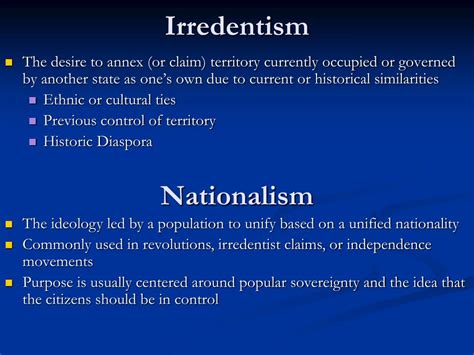Understanding Irredentism: A Geopolitical Force
Irredentism, a powerful force in international relations, denotes a political ideology that advocates for the acquisition of territories claimed to belong historically, culturally, or ethnically to a nation. This expansionist sentiment often sparks conflicts, reshaping geopolitical landscapes and igniting tensions between nations.

Historical Roots: The Birth of Irredentism
The origins of irredentism can be traced back to the 19th century, during the era of nationalism. As nations emerged from centuries of imperial rule, they sought to unify territories they perceived as rightfully theirs. This aspiration often clashed with the boundaries imposed by existing political arrangements.
Contemporary Manifestations: A Global Phenomenon
In the contemporary era, irredentism continues to fuel territorial disputes worldwide. Notable examples include:
- India and Pakistan: Competing claims over the Kashmir region have led to decades of conflict and tensions.
- China and Taiwan: China’s insistence on reunification with Taiwan has strained relations with the self-governed island nation.
- Israel and Palestine: The historical and religious claims over the land of Palestine have created a complex and intractable conflict.
- Russia and Ukraine: Russia’s annexation of Crimea in 2014 and its support for separatists in eastern Ukraine have reignited historical tensions between the two nations.
Causes and Consequences: A Complex Interplay
Irredentism arises from a myriad of factors, including historical grievances, cultural affinities, and ethnic nationalism. These sentiments can evoke powerful emotions, motivating nations to assert their claims through diplomatic pressure, political manipulation, or even military force.
The consequences of irredentism can be far-reaching:
- Conflict and Instability: Territorial disputes fueled by irredentism can lead to armed conflicts, displacement of populations, and regional instability.
- Diplomatic Tensions: Irredentist claims often strain diplomatic relations between nations, creating mistrust and hindering cooperation.
- Economic Disruption: Conflicts and territorial changes can disrupt trade flows, damage infrastructure, and hinder economic development.
Addressing Irredentism: A Delicate Balancing Act
Managing irredentist movements requires a delicate balancing act. Nations must navigate the complex web of historical grievances, cultural identities, and political aspirations. Possible approaches include:
- Diplomatic Negotiation: Bilateral or multilateral talks can aim to find mutually acceptable solutions to territorial disputes.
- International Mediation: Third-party organizations like the United Nations can facilitate negotiations and provide impartial oversight.
- Federalization or Autonomy: Power-sharing arrangements within a federal system or the granting of autonomy to minority groups can address irredentist grievances without resorting to secession.
Case Studies: Irredentism in Action
To illustrate the complexities of irredentism, let’s delve into two case studies:
- The Saar: A Contested Territory: The Saar region, located on the border between France and Germany, has long been a subject of irredentist claims. Historically part of Germany, it was administered by France after World War I. In 1935, a referendum resulted in the region’s reunification with Germany, but this decision was reversed after World War II. Today, the Saar remains an integral part of Germany, although the legacy of its contested past still resonates.
- Transnistria: A Frozen Conflict: Transnistria, a breakaway region in Moldova, declared independence in 1990 and has been involved in a frozen conflict with the Moldovan government ever since. Russia’s support for Transnistria has exacerbated the situation, preventing a lasting resolution. The conflict highlights the challenges of addressing irredentism in the context of unresolved ethnic and historical tensions.
Irredentism and AP Human Geography
Irredentism is a critical topic in AP Human Geography, as it provides a lens through which students can examine the complex interactions between territoriality, ethnicity, and political power. By understanding the causes, consequences, and potential solutions to irredentist conflicts, students can gain insights into the dynamics of global politics.
Irredentism and You: A Global Citizen’s Perspective
As a global citizen, it is important to be aware of the geopolitical implications of irredentism. By understanding the historical, cultural, and political factors that drive these movements, we can engage in informed discussions and contribute to the peaceful resolution of territorial disputes.
Frequently Asked Questions
- What is the difference between irredentism and separatism?
- How does irredentism contribute to nationalism?
- What are the potential risks of irredentism?
- Can irredentism be resolved peacefully?
- What role can international organizations play in managing irredentism?
- How does irredentism impact global security?
- What are the ethical implications of irredentism?
- Can irredentism be justified in any circumstances?
